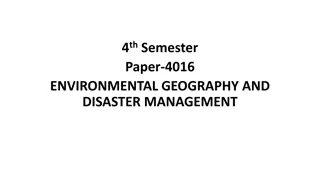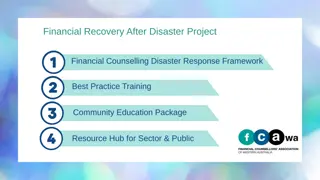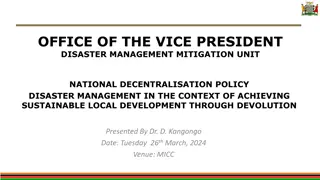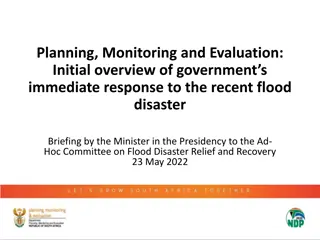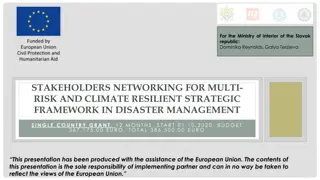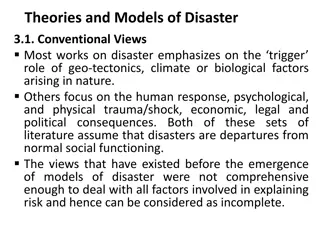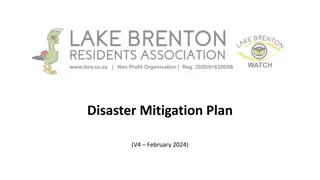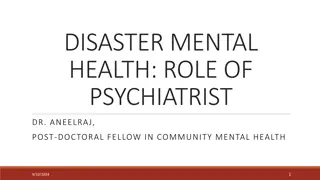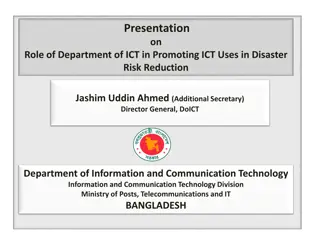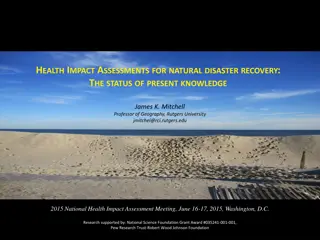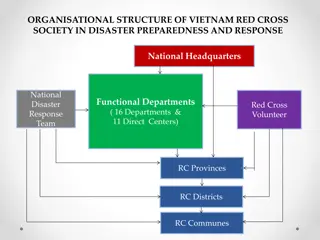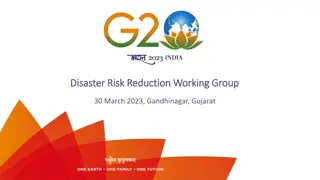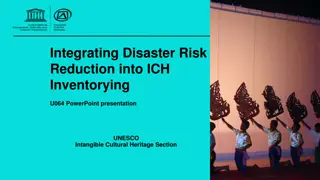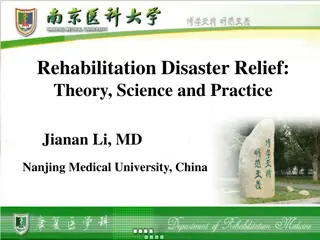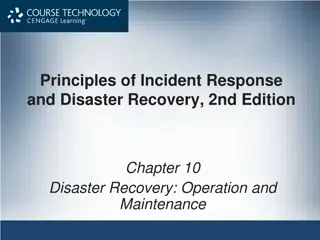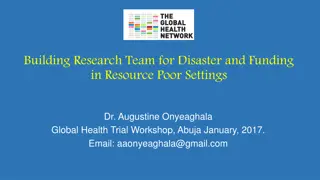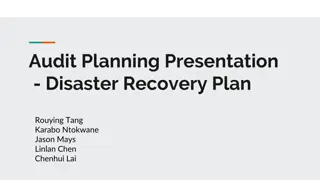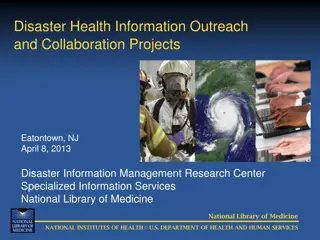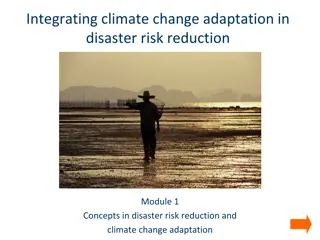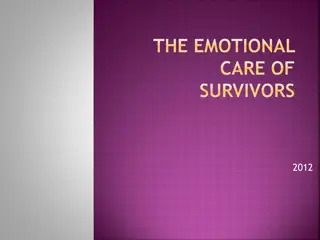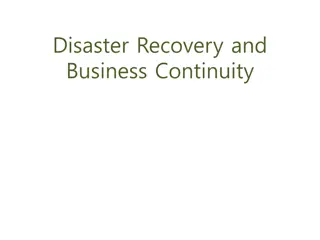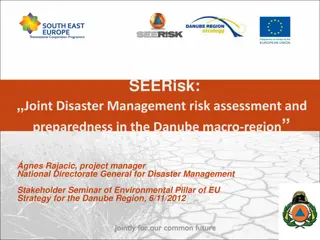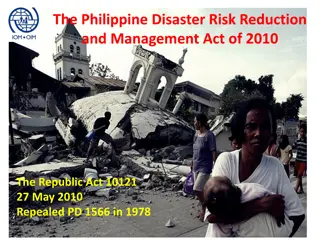International experience in the field of Disaster-related Statistics
Disaster-related statistics encompass data on disaster occurrences, impacts, risk assessment, and post-disaster assessments. The Sendai Framework for Disaster Risk Reduction and the 2030 Agenda for Sustainable Development set global targets and indicators for monitoring disaster risk reduction. Vari
7 views • 6 slides
Understanding Disaster Management Cycle and Phases
Disaster management encompasses planning, organizing, and implementing measures to prevent, reduce, and respond to disasters effectively. The disaster management cycle includes phases such as mitigation, preparedness, response, and recovery. The aim is to reduce potential losses, provide assistance
4 views • 15 slides
Disaster Management and Local Development Through Devolution
The presentation outlined the importance of disaster management in the context of achieving sustainable local development through devolution. It emphasized the need for effective subnational planning, mainstreaming of disaster risk reduction, and financing for disaster relief. The concept of devolut
5 views • 21 slides
Financial Recovery After Disaster Project: Comprehensive Framework for Community Resilience
This project focuses on financial recovery after disasters through financial counseling, disaster response frameworks, best practice training, and community education resources. It emphasizes understanding disaster risk governance, fostering individual responsibility, and identifying community champ
6 views • 5 slides
Theories Explaining Deviant Sexual Behavior Throughout History
Explore historical theories on deviant sexual behavior, including demonological, anomie, psychoanalytical, human ecology, and somatotyping theories. These theories range from supernatural beliefs of possession to scientific interpretations of societal influences and individual characteristics.
2 views • 33 slides
Disaster Management and Sustainable Local Development Through Devolution
The presentation explores the integration of disaster management into subnational planning for achieving sustainable local development through devolution. It emphasizes the importance of decentralization, mainstreaming disaster risk reduction, urban areas' resilience, and financing for disaster reli
3 views • 21 slides
Psychological Theories of Criminality: Understanding the Roots
Psychological theories of criminality delve into the association between intelligence, personality, learning, and criminal behavior. Major theories include Psychodynamic Theory by Freud, Behavioral Theory by Bandura, and Cognitive Theory by Kohlberg. These theories explore how unconscious mental pro
1 views • 20 slides
Exploring Leadership Theories: Traits and Behaviors
Leadership theories have evolved from trait theory focusing on personal qualities to behavioral theories emphasizing actions and interactions. While early research sought universal traits for leadership, it encountered challenges due to varied traits among leaders and non-leaders. Behavioral theorie
2 views • 29 slides
Disaster Resilience Strategy in Developing Countries Vulnerable to Natural Disasters
The IMF's policy paper highlights key challenges faced by small states in building resilience, such as under-investment and donor support post-disaster rather than pre-disaster. The Disaster Resilience Strategy (DRS) emphasizes three pillars for intervention: post-disaster resilience, financial resi
0 views • 11 slides
Unraveling COVID-19 Conspiracy Theories and Hoaxes
Exploring various conspiracy theories surrounding the origins of COVID-19, from bat soup to bioweapons and espionage. Dive into wilder theories involving population control, world war, and even Disney's supposed predictions. Understand the differences between conspiracy theories and hoaxes, shedding
2 views • 11 slides
Government's Immediate Response to Recent Flood Disaster: Overview and Assessment
Understanding the background and context of the recent flood disaster in KwaZulu-Natal (KZN) and other affected areas, this briefing outlines the government's quick response, including the declaration of a national state of disaster, coordination efforts, and actions taken by various government bodi
1 views • 35 slides
Stakeholders Networking for Multi-Risk and Climate Resilient Disaster Management in Slovakia
This project, funded by the European Union, aims to enhance emergency preparedness and response in Slovakia by addressing institutional capacity, coordination, and technology gaps. The goal is to strengthen risk assessment methodologies, involve various stakeholders, and develop disaster-resilient m
1 views • 5 slides
Understanding Sociological Theories and Frameworks
Sociological theories, encompassing micro and macro perspectives, provide a lens to interpret societal dynamics. Consensus theories like functionalism emphasize shared norms, while conflict theories such as Marxism highlight social inequalities. Social action theories like interactionism focus on in
3 views • 21 slides
Understanding Theories and Models of Disaster
Works on disaster traditionally focus on natural triggers and human responses, but older views are considered incomplete. The Pressure-Release Model (PAR) explains vulnerability and risk reduction, highlighting underlying causes and unsafe conditions. Root causes such as economic, demographic, and p
0 views • 17 slides
Online Seminar: Theories of Learning in Initial Teacher Education
This collection of online seminar slides introduces pre-service teachers to major theories of learning, including the Science of Learning through cognitive neuroscience. The presentation aims to help educators consider implications for teaching, recognize theories in action, and pose critical questi
1 views • 11 slides
Theories of Causation in Psychological and Social Sciences
Overview of theories of causation categorized into psychological, social psychological, and sociological perspectives. Psychological theories focus on instinctive, biological, and psychological qualities of abusers, including Attachment Theory, Psychodynamic Theory, Social Learning Theory, and Situa
0 views • 15 slides
Introduction to Quantum Chromodynamics & Field Theories in High-Energy Physics
Explore the fundamentals of Quantum Chromodynamics and Classical Field Theories in this informative lecture, covering topics such as global and local symmetries, Lagrangians, actions, and dynamics. Understand the significance of global and local symmetries in classical field theories, along with exa
2 views • 17 slides
Comprehensive Overview of Student Affairs Theories
This collection explores key theories in student affairs, including cognitive-structural theories, learning theories, and person-environment theories. Cognitive-structural theories delve into how individuals process information, while learning theories examine how people absorb knowledge. Person-env
3 views • 19 slides
Understanding Theories and Concepts in Research
The content delves into the fundamental concepts of theories and variables in research. It discusses the nature of theories, including descriptive, explanatory, and predictive theories. Additionally, it examines the role of concepts in providing identity and meaning to objects and phenomena. Through
2 views • 55 slides
Lake Brenton Disaster Mitigation Plan Overview
The Lake Brenton Residents Association plays a crucial role in disaster response with defined responsibilities including being the first responder, securing the area, and coordinating with authorities. The Disaster Mitigation Plan for Lake Brenton outlines roles, organizational structure, procedures
1 views • 20 slides
Applying Theories and Models in Integrated Health: Module 3 Overview
This module delves into the application of various theories, perspectives, and practice models in integrated healthcare. Students will learn to utilize different theories to enhance their understanding and practice in integrated health, focusing on aspects like personal impact, behavioral change the
0 views • 78 slides
Understanding the Role of Psychiatrists in Disaster Mental Health
Disaster mental health involves applying psychiatric skills to aid individuals and communities in recovering from the psychological effects of disasters. This includes readiness, response, relief, rehabilitation, recovery, and resilience phases. Mental health professionals play a crucial role in ide
0 views • 30 slides
Role of Department of ICT in Disaster Risk Reduction in Bangladesh
The Department of Information and Communication Technology (ICT) in Bangladesh plays a crucial role in promoting the use of ICT for disaster risk reduction. Bangladesh faces numerous catastrophic hazards, making it essential to utilize ICT for warning systems, relief management, and post-disaster ac
0 views • 16 slides
Health Impact Assessments for Natural Disaster Recovery
The study examines the status of knowledge related to health impact assessments for natural disaster recovery, emphasizing the importance of considering the long-term health impacts of disasters. It highlights how disasters and recovery actions can have lasting consequences on community health and w
0 views • 10 slides
Organisational Structure of Vietnam Red Cross Society in Disaster Preparedness and Response
The Vietnam Red Cross Society has a structured organizational setup for disaster preparedness and response, including the National Headquarters, Disaster Management Department, and various functional departments at different levels. The organization has achieved significant results in disaster manag
0 views • 6 slides
Global Initiatives for Disaster Risk Reduction in Gandhinagar
The Disaster Risk Reduction Working Group (DRRWG) in Gandhinagar, Gujarat, is focusing on priorities such as early warning systems, resilient infrastructure, financing, disaster response, and recovery. There is a strong emphasis on the connection between disaster risk reduction and sustainable devel
0 views • 18 slides
Integrating Disaster Risk Reduction into ICH Inventorying for UNESCO
Learn how to apply a community-based approach to inventorying and safeguarding intangible cultural heritage within the context of disasters. This presentation offers frameworks, tools, and exercises to integrate disaster awareness into ICH inventorying and safeguarding practices, emphasizing the imp
0 views • 15 slides
Rehabilitation Disaster Relief: Theory, Science, and Practice
Challenges in Rehabilitation Disaster Relief include lack of extensive rescue capacity, rehab resources and management, fund shortages, and uncoordinated implementation. ISPRM-RDRC outlines past and future actions focusing on the NHV model, mobile rehab teams, international rehab databases, rehab st
0 views • 21 slides
Disaster Recovery Operations and Maintenance Overview
Organizations face key challenges in disaster recovery operations, such as widespread disruptions affecting various levels, communities, and suppliers. Prompt reactions and preparedness are essential to navigate through the phases of a disaster recovery plan - preparation, response, recovery, resump
0 views • 48 slides
Building Research Team for Disaster and Funding in Resource-Poor Settings
Disaster research team building is essential for effective disaster management in resource-poor settings. Dr. Onyeaghala emphasized the importance of competent teams in mitigating, preventing, managing, and monitoring health disasters. The workshop in Abuja highlighted the critical competencies and
0 views • 24 slides
Theories and Concepts in Semantics: Classical vs. Prototype Approaches
Explore different theories of concepts in semantics, including classical theories based on necessary and sufficient conditions, causal theories, and prototype theories. Compare their strengths and limitations in handling fuzziness, asymmetry, and internal structure of concepts. Discover how experime
1 views • 46 slides
Disaster Recovery Plan Audit for Berry College
Berry College's Information Technology Disaster Recovery Plan is a vital strategy to ensure the continuity of IT operations in the event of a disaster. This audit plan presentation outlines the objectives, scope, and responsibilities involved in auditing and maintaining the effectiveness of the disa
0 views • 20 slides
Integrating Theories and Models for Enhanced Health Practice
Explore the application of theories, perspectives, and practice models in integrated health through Module 3. Learn how theories guide assessment, treatment, and patient outcomes. Discover common theories enhancing assessment and supporting individuals through grief and loss. Gain insights into the
0 views • 78 slides
Disaster Health Information Outreach and Collaboration Projects: Enhancing Disaster Preparedness
This project by the National Library of Medicine aims to improve access to disaster medicine and public health information for the disaster health workforce through partnerships with various organizations across the United States. Seven projects are awarded annually, focusing on enhancing disaster p
0 views • 15 slides
Integrating Climate Change Adaptation in Disaster Risk Reduction Module 1
Welcome to the e-Learning module on integrating climate change adaptation in disaster risk reduction. This module covers concepts in disaster risk reduction and climate change adaptation. It is part of a package that includes five modules focusing on vulnerability, disaster risk reduction, climate c
0 views • 29 slides
Supporting Emotional Well-being in Disaster Survivors: Resources and Training
Explore resources from the Missouri Department of Mental Health for providing emotional care to disaster survivors. Learn about stress responses, training programs like Psychological First Aid, and access web resources for disaster readiness. Contact Jenny Wiley, Coordinator of Disaster Services, fo
0 views • 8 slides
Importance of Disaster Recovery and Business Continuity Planning
Disaster recovery and business continuity planning are crucial for businesses to survive major disasters and continue operations. This involves assessing business impacts, creating documentation, and planning for various types of disasters. Failure to plan can lead to significant revenue loss, damag
0 views • 46 slides
Understanding SBA Disaster Loans for New Castle County, DE
Explore the role of the Small Business Administration in disaster recovery through its loan programs for businesses, homeowners, and renters in New Castle County, DE. Learn about the types of SBA disaster declarations, loan programs offered, limits on loan amounts, and details of the recent New Jers
0 views • 20 slides
SEERisk: Disaster Management and Preparedness in the Danube Macro-Region
Joint Disaster Management project SEERisk aimed to assess and enhance preparedness in the Danube macro-region, involving multiple stakeholders in environmental disaster risk reduction. The project, led by gnes Rajacic, Project Manager at the National Directorate General for Disaster Management, focu
0 views • 17 slides
Enhancing Disaster Risk Reduction in the Philippines
The Philippine Disaster Risk Reduction and Management Act of 2010, also known as Republic Act 10121, replaced PD 1566 and introduced a proactive approach to disaster management, focusing on risk reduction and building community resilience. The new law aims to transform and reform disaster response b
0 views • 26 slides

